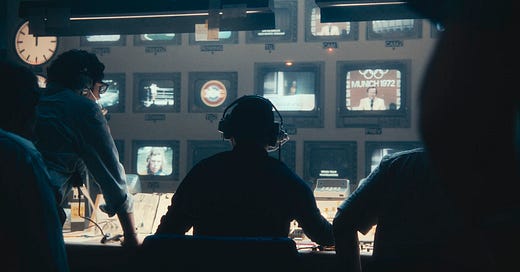'September 5': The Day the News Broke
Tim Fehlbaum's riveting drama shows a turning point in following the story and creating televised drama.
On June 17, 1994, suspected murderer O.J. Simpson, rather than turn himself in to authorities, went on a slow-moving car chase through Los Angeles. The “chase” excited the news media, who could not get enough of a famous athlete now fleeing from police, and the breathless coverage marked a moment in TV history where the news presented itself more like an action movie than a journalistic enterprise.
To see how this behavior emerged, it’s useful to go back to September 5, 1972, and another event involving athletes. Tim Fehlbaum’s new movie September 5 opens by telling us that ABC Sports had the unique presence of a worldwide satellite, which gave it the ability to broadcast the games around the world live, a serious technological advance in an age where most coverage still had to be done on physical film. This change put ABC Sports at the forefront of a new media world when the terrorist group Black September kidnapped the Israeli Olympic team on September 5th at the 1972 Munich Olympics.
The fascinating crucible September 5 uses is to take extreme competence and tempt it with competition. The tools at the disposal of these broadcasts are all analog, and everyone in the control room, despite being there to cover sports, takes the kidnapping of the hostages with extreme seriousness. They know they’re in uncharted territory, but they’re doing their best to follow the story and use clever means to ensure that ABC Sports provides the closest coverage of unfolding events. No one here relishes a ratings bump, but they’re also fiercely protective of a story they see as theirs, not ABC News or a rival network.
Last year, Christopher Nolan said the story of his movie Oppenheimer, “Like it or not, we live in Oppenheimer’s world.” You can’t unring the bell when it comes to the threat of nuclear annihilation. Similarly, September 5 makes the case that whether we like it or not, we’re living in the choices made by a handful of guys in a control room in Munich, Germany. Our news media environment reached a turning point, and guys who went to Munich to cover competition ended up in a competition of their own, and those competitive choices drove them to make decisions that changed how live television handles the news.
The problem isn’t that “journalism is the first draft of history” and that some details may be wrong; as September 5 shows in exhilarating detail, the problem is that the human desire for narrative cohesion, structure, and catharsis does not adhere to the chaos of the real world, and trying to impose a story in real time to chaotic events means that you’re no longer following the story, but creating one. When Fehlbaum shows us all the analog tools being used by our characters, it’s not simply to emphasize the distance in technology over the past 52 years. It’s to make the viewer realize that if these journalists, with all the technological impediments slowing them down and forcing them to think about their coverage, could still get it wrong, then should we be surprised that our near-instantaneous ability to cover major events leads to major misunderstandings of what’s happening around us?
In his “Keynote Address to the Radio and Television News Directors Association,” journalist Edward R. Murrow said of television, “This instrument can teach, it can illuminate; yes, and it can even inspire. But it can do so only to the extent that humans are determined to use it to those ends. Otherwise, it is merely wires and lights in a box.” September 5 is a rebuttal to Murrow’s belief that wise men can make better decisions against the technology in their hands. Our main characters all mean well. They’re smart, dedicated journalists. But they get carried away by the power at their disposal, by where new wires and new lights allow them to go. The thrill, adrenaline, and need to “beat” their competitors leads to a serious journalistic error. Rather than correcting that error, September 5 reminds us that we’ve spent the past decades compounding it with a news media more concerned about delivering an exciting story quickly rather than a nuanced story correctly.
September 5 is now playing in theaters in limited release.






I’m also reminded of the Apollo 13 episode of From the Earth to the Moon, where the story centers on the media’s coverage of the events, rather than rehash the film, Apollo 13. I know that it wasn’t a literal movie recounting of what happened during that space flight, but it was a brilliant indictment of the shift in our news coverage that came with the rise of television and its technological advances.